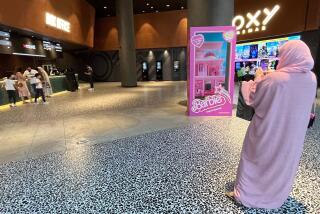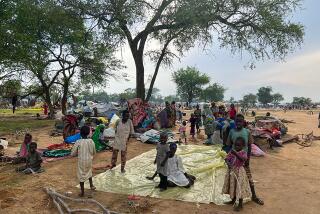Joint fight with Arabs against Kadafi spurs Berber hopes of equality in Libya
- Share via
Reporting from Zintan, Libya — Before the Libyan uprising this year, Salah, a proud Arab, never would have approved if his sister had decided to marry a Berber, a long-oppressed ethnic group populating large parts of western Libya and the rest of North Africa.
But the battle against Libyan leader Moammar Kadafi’s rule has fused the destinies of the two people, especially in the Nafusa Mountains where Arab and Berber towns rely on one another for survival.
“There is one particular Berber who I got to know after the revolution,” said Salah, who asked that his last name not be published because of the sensitivity of the issue. “I would be proud if my sister married him.”
As the two ethnic groups put aside long-held differences, at stake may be more than the fate of the communities along this sparsely populated western mountain range.
Removal of social barriers between the disparate groups in these mountains, and elsewhere in the Arab world, could counter claims by leaders such as Kadafi, Syrian President Bashar Assad and Yemeni President Ali Abdullah Saleh that Arab states divided along tribal, ethnic or religious lines would explode without a strongman at the top.
North Africa’s Berbers have been key, if unsung, players in the Arab uprisings.
In Morocco, where Berbers constitute nearly half the population, King Mohammed VI made their Tamazight language an official one in part to appease a smoldering protest movement. Tunisia’s tiny Berber minority hopes that the toppling of longtime strongman Zine el Abidine ben Ali might pave the way for language and cultural rights.
Kadafi has ruthlessly denied the existence of Libyan Berbers, even insisting on calling them Arabs during a rare June 2008 visit to the mountains and allegedly orchestrating a violent attack on the town of Yafran later that year.
“You can call yourselves whatever you want inside your homes — Berbers, children of Satan, whatever — but you are only Libyans when you leave your homes,” a contact of the U.S. Embassy said Kadafi had privately told the leaders of the community, according to a State Department document published by WikiLeaks.
“Tamazight was forbidden. You might lose your life or freedom if you spoke out for your rights,” said Abdullah Funas, a Libyan Berber who previously served as a diplomat and now is an opposition leader in the mountain town of Jadu. “We spoke it in our homes and that’s it.”
Kadafi and his deputies tried to play the two groups against each other.
“When he’s coming to us, he was saying, ‘Watch out for the Berber; he wants to run you out of the western mountains,’” said Mokhtar Fakhal, a town elder in Zintan. “When he went to the Berbers, he would say, ‘Watch out for the Arab; you were here first.’ That’s why we hated each other.”
Zintan, a farming hub of 25,000, served as Kadafi’s primary tool for keeping the Berbers in line.
“He made Zintan his right hand,” said Magdis Bouzakher, a Berber rights activist in Yafran. “He armed all the Zintanis and gave them high positions.”
Berbers in these mountains said they were inspired to wholeheartedly join the uprising that began in mid-February when they saw the Arabs put aside decades of privileges Kadafi had bestowed upon them and join the rebellion that began in the country’s east.
Zintan and Kikla, another Arab town, “from the very first day decided they would use their weapons against Kadafi,” Bouzakher said.
Now Arabs openly call for Berber language rights. Arabs and Berbers train together on military bases in preparation for battle. They join up on front lines.
“Where I was training, it was all Berber,” said Abdul Taif, 19, a London engineering student from the Arab city of Gharyan, at the eastern edge of the mountains, who has joined the fighters. “It doesn’t matter anymore.”
And in an extraordinary moment, the leaderships of the Arab and Berber towns joined to criticize a Berber town, Nalut, for launching an ill-fated attack on Kadafi’s forces without proper backup.
“A reason for the revolution against Kadafi was to get rid of the divisions he tried to impose on us,” said Col. Mokhtar Milad Fernana, commander of overall forces in western Libya and the primary military liaison to the rebel leadership in the eastern hub of Benghazi.
Still, tensions remain between the two groups, even over simple issues such as the name of the place they call home. Berbers call the mountain range by its Tamazight name, Nafusa; Arabs insist on calling it the Western Mountains, a name some say was first used by Kadafi to whitewash the region’s Berber heritage.
Arabs and Berbers acknowledge that there’s very little intermarriage.
“I would not like my sister to marry an Arab because of our traditions,” said Muhannad Abdul Salaam, 27, a Berber activist in the city of Qala. “I don’t want to lose my language.”
Berbers accuse the Arabs of not being prudent with their money and being less educated and successful despite the advantages they have had under Kadafi.
“Don’t get me wrong, but the Arab people got good opportunities because of Kadafi’s support,” said Salem Omar Muqsa, 38, a Berber Justice Ministry employee in Qala. “We, on the other hand, were deprived, so we strive harder.”
Community leaders dismiss such sentiments as poisonous and fast-fading remnants of Kadafi’s divisive rule.
“Kadafi wants us to kill each other,” said Fakhal, the town elder from Zintan. “But we have to show everyone that we can live together.”
More to Read
Sign up for Essential California
The most important California stories and recommendations in your inbox every morning.
You may occasionally receive promotional content from the Los Angeles Times.













